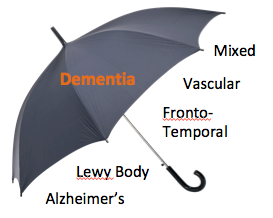
Dementia. A word you’ve likely heard or read. You may even know someone diagnosed with this life-changing disease.
It’s not too late to start now and take care of your brain!
What is Dementia?
Dementia is a general term for loss of memory, language and problem-solving. These symptoms will worsen as the disease spreads through the brain.
Dementia will interfere with daily life and functioning. Most patients will rely on others – such as their spouse, children or hired caregivers – to care for them. Some will end up in a long-term care facility having nurses and nurse aides care for them.
There are several types of dementia and Alzheimer’s disease is the most common. The following graphic lists the types of dementia.

Symptoms of Dementia
Patients will experience:
- Problems with short-term memory
- Inability to plan meals or pay bills
- Confusion regarding time and place
- Difficulty completing familiar tasks
- Trouble with talking or writing
- Changes in mood or personality
What Are My Chances of Getting Dementia?
We can’t change some things, such as genetics, gender and age. In fact, age is the strongest risk factor for dementia. Women are also more likely than men to develop the disease.
However, there are some risk factors that can be changed. It has been estimated that around 40% of dementia cases may be the result of 12 key risk factors:
- High blood pressure
- Smoking
- Diabetes
- Obesity
- Lack of exercise
- Poor diet
- High alcohol intake
- Depression
- Not engaging your brain
- Traumatic brain injuries
- Hearing loss
- Social isolation
How Can I Prevent Dementia?
Start focusing on your brain health now – no matter your age!
Brain health, or cognitive health, refers to skills such as remembering, learning new things, planning, concentrating or making decisions. When cognitive health is impaired (referred to as cognitive impairment), a person has trouble with these skills, which can affect the things he or she can do in everyday life.
High blood pressure is a key risk factor to focus on. People who have consistent high blood pressure (hypertension) are more likely to develop dementia compared to those with normal blood pressure.
High blood pressure damages the blood vessels in the brain, leading them to become narrowed or blocked. This will lead to less blood flow to the brain and can increase the risk of developing dementia, particularly vascular dementia.
What can you do to help your blood pressure?
- Lose weight. Blood pressure increases with weight gain, especially if the extra weight is around your waist.
- Eat a healthy diet. Eating whole grains, fruits, vegetables and low-fat dairy products, as well as foods low in saturated fat and cholesterol, will help keep your blood pressure down.
- Cut your salt intake. A diet high in salt can lead to water retention, especially in blood vessels, leading to higher blood pressure readings.
- Exercise. Shoot for 30 minutes a day such as walking, jogging, cycling, swimming or dancing. Strength training or light weights can also help.
- Sleep. Less than six hours of sleep at night can lead to higher blood pressure readings.
- Lower stress. Try to avoid triggers that cause stress, avoid trying to do too much and take time to relax.
If you suspect you or a loved one may have Alzheimer’s disease or another dementia, UofL Physicians – Neurology can help. You can call 502-588-4800 to schedule an evaluation.
The University of Louisville Trager Institute/Republic Bank Foundation Optimal Aging Clinic provides wellness and lifestyle services, mental health support, resources about dementia and brain health, and more. To request an appointment or learn more about services offered, call 502-588-4340.
References
Alzheimer’s Association – What is Dementia, Signs and Symptoms, and Causes
https://www.Alz.org/Alzheimers-Dementia/What-is-Dementia
Centers for Disease Control and Prevention – Promoting Brain Health
https://www.CDC.gov/Aging/PDF/Cognitive_Impairment/Cogimp_Genaud_Final.pdf









